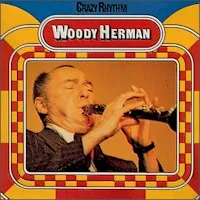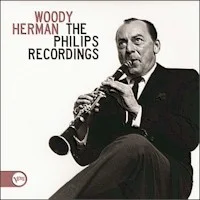Styles: Saxophone, Clarinet Jazz
Year: 1972
File: MP3@320K/s
Time: 41:36
Size: 96,0 MB
Art: Front
(4:36) 1. Fat Mama
(5:42) 2. Alone Again (Naturally)
(5:16) 3. Watermelon Man (Sandia Chicano)
(4:18) 4. It's Too Late
(4:30) 5. The Raven Speaks
(6:27) 6. Summer of '42
(6:53) 7. Reunion at Newport 1972
(3:51) 8. Bill's Blues
The Raven Speaks
Year: 1972
File: MP3@320K/s
Time: 41:36
Size: 96,0 MB
Art: Front
(4:36) 1. Fat Mama
(5:42) 2. Alone Again (Naturally)
(5:16) 3. Watermelon Man (Sandia Chicano)
(4:18) 4. It's Too Late
(4:30) 5. The Raven Speaks
(6:27) 6. Summer of '42
(6:53) 7. Reunion at Newport 1972
(3:51) 8. Bill's Blues
The best of his Fantasy releases of the '70s, this well-rounded CD is highlighted by a great jam on "Reunion at Newport" and strong soloing from Herman (on soprano and clarinet), pianist Harold Danko, trumpeter Bill Stapleton and the tenors of Gregory Herbert and Frank Tiberi. The Herman orchestra performs a couple of modern ballads ("Alone Again Naturally" and "Summer of '42"), some blues and a few swinging numbers, showing off their versatility with expertise and spirit. ~ Scott Yanow https://www.allmusic.com/album/the-raven-speaks-mw0000677670
Personnel: Woody Herman - alto saxophone, soprano saxophone, clarinet; Al Porcino - trumpet, leader; Charles Davis - trumpet; John Thomas - trumpet; Bill Stapleton - flugelhorn; Bill Byrne - trumpet; Bob Burgess - trombone, leader; Rick Stepton - bass trombone; Harold Garrett - bass trombone; Frank Tiberi - tenor saxophone, flute, cowbell; Greg Herbert - tenor saxophone, piccolo, alto flute, flute; Steve Lederer - baritone saxophone; Tom Anastas - baritone saxophone; Joe La Barbera - drums; Alphonso Johnson - bass; Harold Danko - fender rhodes electric piano; Pat Martino - guitar; John Pacheco - congas.
Personnel: Woody Herman - alto saxophone, soprano saxophone, clarinet; Al Porcino - trumpet, leader; Charles Davis - trumpet; John Thomas - trumpet; Bill Stapleton - flugelhorn; Bill Byrne - trumpet; Bob Burgess - trombone, leader; Rick Stepton - bass trombone; Harold Garrett - bass trombone; Frank Tiberi - tenor saxophone, flute, cowbell; Greg Herbert - tenor saxophone, piccolo, alto flute, flute; Steve Lederer - baritone saxophone; Tom Anastas - baritone saxophone; Joe La Barbera - drums; Alphonso Johnson - bass; Harold Danko - fender rhodes electric piano; Pat Martino - guitar; John Pacheco - congas.
The Raven Speaks

















